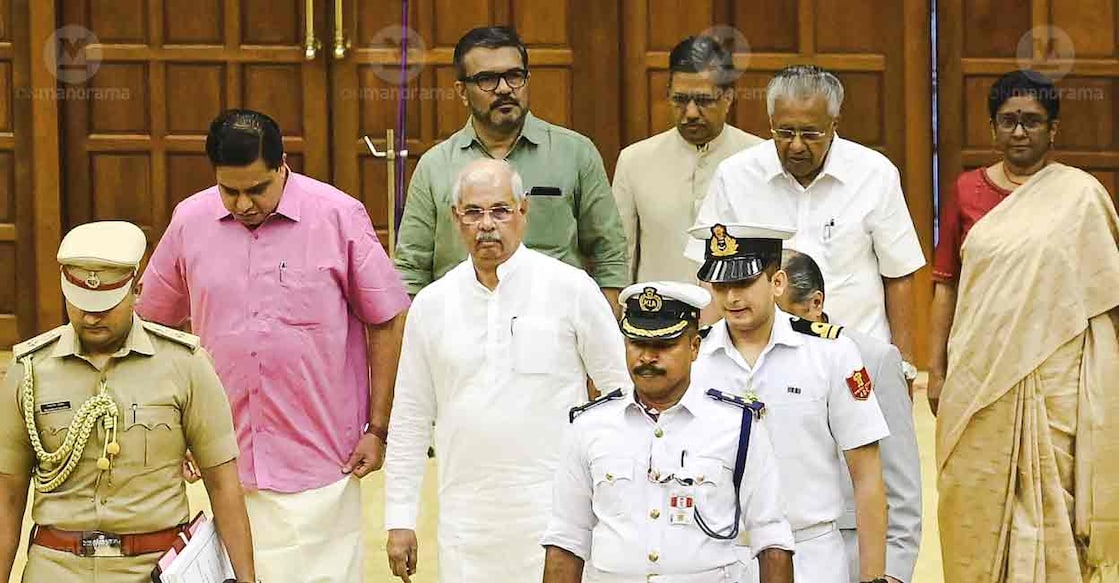Analysis | Tame policy draft with no Centre-bashing gives Arlekar painless speech delivery

Mail This Article
After five years of previous Governor Arif Mohammad Khan's subversive ways, it looks like order has been restored at the top of Kerala government's executive.
Delivering his first policy address on Friday, Kerala's new Governor Rajendra Arlekar seemed to have pulled the gubernatorial office back to its conventional role of functioning as the ventriloquist's dummy, the state government's voice.
Standing for two hours, the Governor read out with seeming conviction the entire 89-page speech written for him by the government, at times even demonstrating a certain pride in the achievements of "my government".
The only moments the Governor looked uncomfortable was when he had to pronounce place names like Pathanamthitta or Cherukullathoor and government schemes like 'Samrambhakathwa Sabha' (a forum for entrepreneurs to express their concerns). Even this he turned in his favour because at the end, winning over the entire House, Arlekar apologised for mispronouncing some Malayalam words.
Fact is, there was nothing in the two-hour speech that could have annoyed the Governor. A closer reading of the Governor's address can confuse one as to who the ventriloquist is and who the dummy.
If three big grievances had found their way into the policy address, it could have worsened the Centre-state divide and potentially made the Governor uncomfortable.
One, the tight fiscal squeeze Kerala feels the Centre has unjustly applied on Kerala. Two, the draft UGC regulations that grant Governors the power to pick vice-chancellors of state universities, and against which the Kerala government has vehemently objected. And three, the Kerala government's resentment of the Centre for its reluctance to offer generous support for the rehabilitation of Mundakkai-Chooralmala survivors.
The last two concerns (UGC draft and landslide rehab) were not brought up in the Governor's address. The primary grouse, of the Centre's fiscal tyranny, was mentioned but the words were shorn of all bite.
Here is the anti-Centre stretch in this year's speech. "The cessation of GST compensation and revenue deficit grants coupled with restrictive conditions on centrally-sponsored schemes and new borrowing constraints have posed significant fiscal challenges for my government." The tone is passive, and non-accusatory.
Now, sample the anti-Centre stretch in the speech that was offered to Arif Mohammad Khan in 2024. "My government places the considered opinion before the Union Government that Kerala should be ensured its well-deserved share in the distribution of taxes. My government views with concern the holding back of eligible grants and share of assistance in centrally-sponsored schemes. My government is put under added liquidity stress because of the retrospective cut in borrowing limits, which is not in accordance with the accepted recommendations of the 15th Finance Commission. This stand of the Union Government needs an early reconsideration."
What stands out here is a bold sense of entitlement and the unbearable indignation of having been wronged. What's more, the Centre is even served an ultimatum. (Forget reading this passage, Arif Khan last year virtually boycotted the entire speech. He arrived in the Assembly but took just 1.15 minutes to read the 69-page text, making it the shortest ever policy address.)
As intriguing as the softening of the anti-Centre rhetoric was the Kerala government's move to sanitise the policy address of anything that a Centre's nominee like a Governor would find offensive.
In previous years, highly polarising central government moves like the Citizenship Amendment Act (CAA), farm bills and the Uniform Civil Code were subjected to withering attacks in the Governor's speeches.
Governor Arif Khan, for instance, was made to read a critique of the CAA in his very first policy address in 2020. "Our citizenship can never be on the basis of religion as this goes against the grain of secularism, which is part of the basic structure of our Constitution," Khan had to parrot.
But he did so with an inventive qualification, an improvisation no Governor had attempted before. "I have been corresponding with the honourable Chief Minister for the last few days. I have my reservations. But I am going to read this para because the honourable Chief Minister wants me to read this, although I hold the view that this does not come under the definition of policy or programme," Governor Khan had said.
For Governor Arlekar, at least in his first speech, there was no need to resort to any such unconventional ways to express dissent. Last year, the Governor's speech sought to resist the NCERT curriculum changes; a range of topics like Mughal history, partition of India, the martyrdom of Mahatma Gandhi, Five Year Plans, Emergency, Popular Struggles in India, social conditions in India and caste system were removed from school texts.
The speech also documented Kerala's valiant revolt against the move. "My government launched additional textbooks in humanities to ensure real historical and social awareness to the children," it said.
The draft UGC regulations, going by the state government's objections to it, is also seen as a right-wing political project. A week ago Chief Minister Pinarayi Vijayan had called the draft a "secret project" to sneak in the Sangh Parivar agenda in the country's higher education sector. Yet, there was no mention of it in Arlekar's first address.
Equally surprising was the government's decision to keep out its running feud with the Centre over financial support to the landslide victims. Wayanad rehabilitation was mentioned in the speech but not a word of the Centre's alleged apathy could be found.
Nonetheless, the speech was not all tame in terms of its combative spirit. There was one sentence that was politically potent, and it came last. "My government feels that attempts to homogenise differences in a country which has accommodated diversity with respect will run counter to constitutional values and lofty ideals of the nationalist movement," Governor Arlekar, a leader who has his roots in RSS, said in conclusion. Finally, a punchline for a speech that packed no punches.


